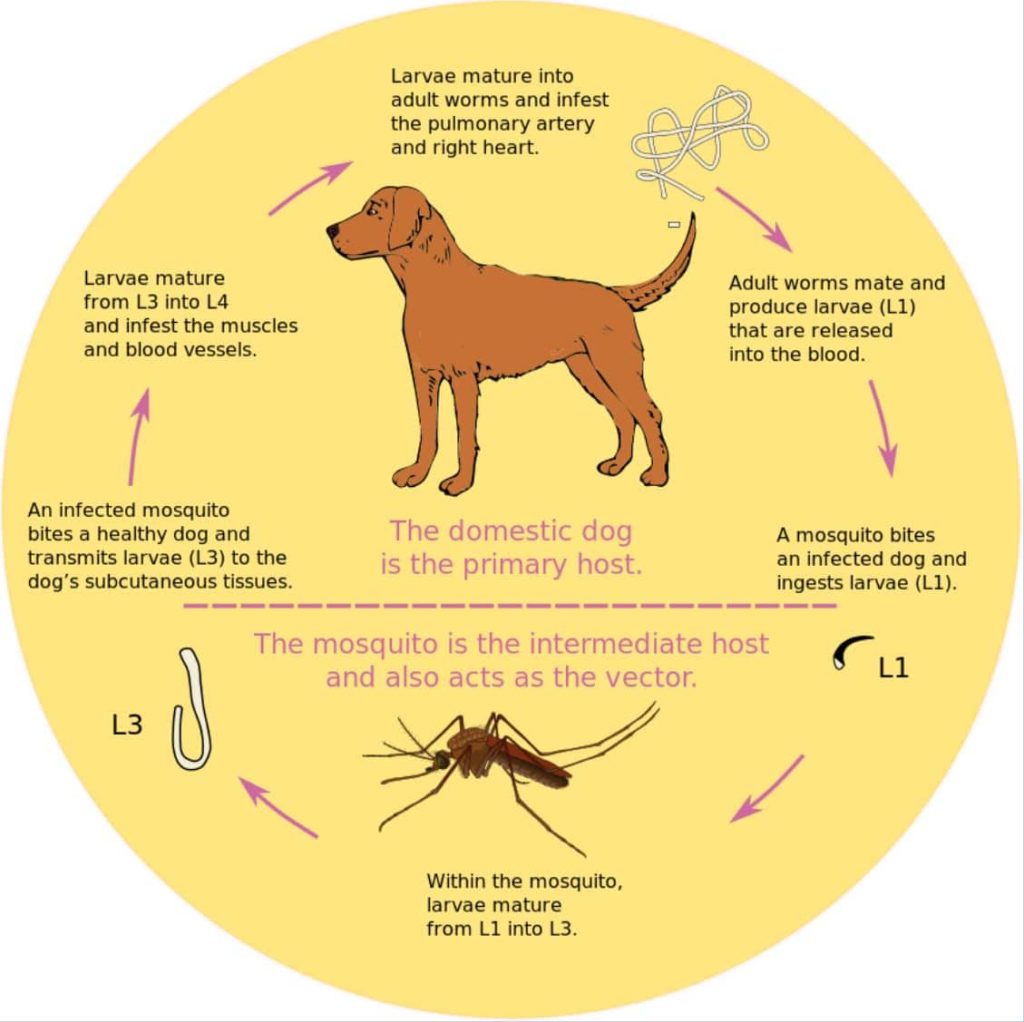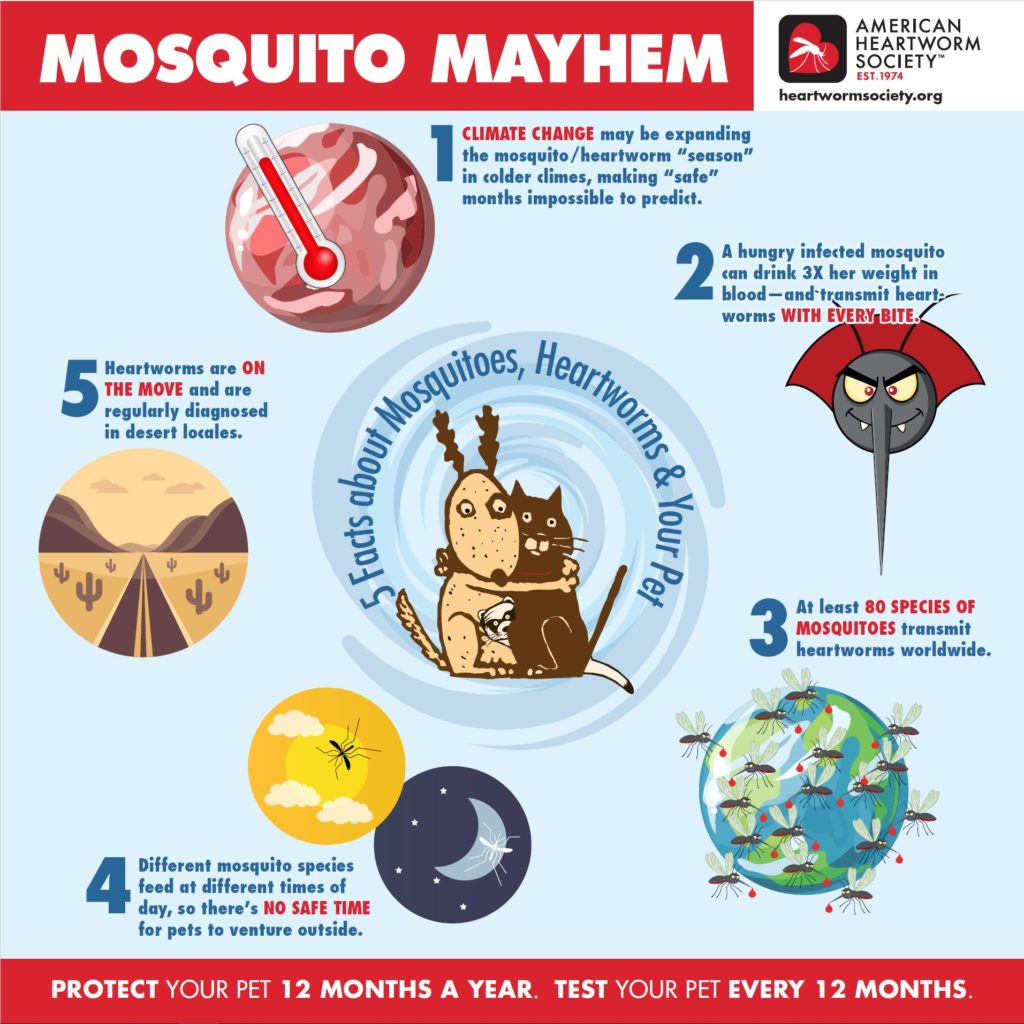The short answer to that question is YES! Your dog does really need heartworm prevention. Heartworm prevention is a very important part of your dog’s overall wellness. Some parts of the country (and world) have a bigger problem than others when it comes to heartworm disease, but overall, no matter where you and your dog live, heartworm prevention is extremely important in keeping your dog happy and healthy.
What are heartworms?
Heartworms are long thin white worms. Mosquitoes can transmit heartworms. These worms live in the blood vessels, heart, and lungs of affected pets. The adult female heartworms live in the heart and lungs of the infected dog and produce microfilaria, which are essentially baby heartworms. The microfilaria circulate in the dog’s bloodstream. When a mosquito bites the dog and gets a blood meal, they are ingesting the microfilaria. These baby heartworms turn into larva inside the mosquito. When the mosquito bites another dog, they give that dog the larva which enter the blood stream and develop into new adult heartworms over a period of 6 months. The adult heartworms then go to live in the heart and lungs and start to cause problems for the dog. Adult heartworms can live anywhere from 5 to 7 years in dogs.
What pets get heartworm disease?
Both domestic and wild dogs (such as wolves, foxes, and coyotes) can have heartworm disease. Cats and ferrets can also get heartworm disease, and in rare cases, even humans. Heartworm’s natural hosts are Dogs. This means that a heartworm can live out it’s full life cycle in dogs and dogs can have hundreds of them inside.

This also means that dogs can essentially pass it to other dogs, through the bite of a mosquito of course. Heartworm disease in cats is a little different. Typically, heartworms don’t grow to the adult stage in cats and cats don’t get as many at a time. This can be a problem because without adult heartworms, it can be hard to diagnose heartworm disease in cats.
What is heartworm disease?
heartworm infections in dogs causes Heartworm disease. Dogs get heartworm disease when an infected mosquito bites them through the life cycle mentioned above. When a dog is first infected, they usually don’t show any signs, because for the first 6 months after they are bit by a mosquito, the heartworm larva is maturing into an adult. Once there are adult heartworms living in the heart and lungs of the dog, the dog can show signs of sickness. The more heartworms there are, the sicker the dog.
The most common signs of heartworm disease in dogs are:
- coughing
- becoming easily tired
- weight loss
- decreased appetite.
Advanced heartworm disease can cause heart failure, fluid in the abdomen, blockage of blood vessels, labored breathing, brown colored urine, sudden collapse, and death.
How do you tell if a dog has heartworm disease?
Veterinarians diagnose heartworm disease with a simple heartworm test. At a minimum, dogs should be tested every year, even those that are on year-round heartworm prevention. Heartworm tests can detect early heartworm disease in a dog that is not symptomatic and can also diagnose heartworm disease in a dog that is sick.
A heartworm test detects heartworm antigen in the blood sample of a dog. Your veterinarian will draw a very small sample of blood and usually run the test right in the hospital. Results are shown within less than 10 minutes. If your dog tests positive, your veterinarian might want to run a confirmatory test at a lab in addition to some other tests to see if there is anything else wrong.
It takes 6 months for a heartworm to develop into adult. Tests can only detect adult heartworms. This is why a puppy has to be over 6 months of age for a test to tell if they have heartworms or not.
How do you prevent heartworm disease?
Heartworm disease is prevented by giving your dog a heartworm preventive. Heartworm preventives consist of medication that kills the heartworms when they enter the body. There are several types of heartworm preventives including chews, tablets, topicals or spot-on treatment, and injectables. Most of the oral and topical preventives are given monthly, while the injectables can be given every 6 or 12 months. Many heartworm preventives include dewormers for intestinal parasites or flea and tick prevention as well. It is best to talk to your veterinarian about which type of heartworm prevention is best to give your dog which can depend on age, location, environment, activity of the dog, and underlying health conditions.
Your dog should be covered by a heartworm preventive year-round and it should be started when the dog is a puppy. It is important to give them regularly and that your dog is protected at all times. It is even important that dogs who live in colder environments receive heartworm prevention. Heartworm preventives even protect dogs who were infected in the past month. Remember, it only takes one bite from a mosquito for your dog to get heartworms.
It is very important that you give your dog an FDA-approved, veterinary prescribed heartworm preventive. Natural preventives are not effective for preventing heartworm disease, although some may reduce the number of mosquitos, which can be helpful.
A list of the available heartworm preventives can be found here.
How do you treat heartworm disease?

If a dog is diagnosed with heartworm disease they should be treated. Your veterinarian will work with you to develop the best diagnostic and treatment plan for your dog. Treatment is intense, long, and can be very expensive. It usually consists of monthly heartworm prevention, antibiotics such as Doxycycline that kill the bacteria helping to keep the heartworms alive, anti-inflammatory medication, immiticide medication that kills the adult heartworms, and strict exercise restriction. Treatment for heartworm disease is not without its own risks. Some dogs can have bad reactions to the medications, and it may not work fast enough compared to the severity of the disease the heartworms are causing.
If you have more questions or want to know more about heartworm disease, visit the American Heartworm Society website or talk to your veterinarian.
Do you Know About Dog Vaccinations?
Have you ever heard of the dhpp vaccine? Learn about all of the diseases and sicknesses you need to prevent your dog from getting here. An ounce of prevention is worth a pound of cure!







